
Journal of Operational Oceanography
Scope & Guideline
Unveiling the Secrets of the Sea with Cutting-Edge Research
Introduction
Aims and Scopes
- Operational Forecasting and Modelling:
The journal emphasizes the development and validation of operational ocean forecasting systems, including numerical models and data assimilation techniques that enhance predictive capabilities for various oceanic phenomena. - Marine Ecosystem Dynamics:
Research focusing on the interactions between physical oceanographic processes and marine ecosystems is a core area. This includes studies on nutrient dynamics, biological productivity, and the effects of environmental changes on marine life. - Coastal and Regional Studies:
The journal covers studies specific to coastal and regional oceanography, addressing local phenomena such as upwelling, sediment transport, and the impact of human activities on coastal environments. - Climate Change and Environmental Impact:
A significant focus is placed on understanding the impacts of climate change on ocean systems, including changes in sea surface temperature, ocean heat content, and extreme weather events. - Technological Innovations in Ocean Monitoring:
The journal also highlights advancements in ocean observation technologies, such as satellite data, high-frequency radar, and in-situ measurement systems, which are crucial for improving operational oceanography.
Trending and Emerging
- Integration of Machine Learning and AI:
There is a growing trend towards utilizing machine learning and artificial intelligence in ocean forecasting models, enhancing predictive accuracy and efficiency in data analysis. - Impact of Extreme Weather Events:
Research focusing on the impacts of extreme weather, such as tropical cyclones and marine heatwaves, is increasingly prominent, reflecting the urgent need to understand and mitigate climate-related impacts on marine systems. - Sustainable Marine Resource Management:
Emerging studies are increasingly addressing the sustainable management of marine resources, including fisheries and coastal ecosystems, in light of anthropogenic pressures and climate change. - Multi-Scale and Multi-Source Data Integration:
There is a notable emphasis on integrating diverse data sources, including satellite, in-situ, and model data, to improve the accuracy and reliability of ocean forecasts. - Coastal Resilience and Adaptation Strategies:
Research aimed at enhancing coastal resilience against climate change and human activities is gaining traction, highlighting the importance of adaptive management practices in coastal regions.
Declining or Waning
- Traditional Physical Oceanography:
Themes focused solely on traditional physical measurements and modeling without integration with biological or ecological aspects have seen a decline, as interdisciplinary approaches become more favored. - Static Environmental Monitoring:
There is a noticeable decrease in studies centered on static or long-term monitoring of environmental parameters, as the focus shifts towards dynamic modeling and real-time forecasting. - Historical Oceanographic Case Studies:
Research that primarily emphasizes historical data analysis without immediate operational relevance is becoming less frequent, indicating a shift towards research that offers actionable insights for current challenges.
Similar Journals

Ocean and Coastal Research
Bridging science and sustainability in oceanography.Ocean and Coastal Research, published by the Institute Oceanográfico of the University of São Paulo, is an essential academic journal dedicated to advancing the fields of Aquatic Science, Oceanography, and Water Science and Technology. Established in 2020, the journal has quickly become a noteworthy platform contributing to the understanding and sustainable management of marine and coastal ecosystems, with an open access model that promotes the dissemination of critical research findings. Although currently categorized in the fourth quartile across its respective fields in 2023, the journal serves as an emerging repository of valuable insights for researchers, professionals, and students alike, aiming to make impactful discoveries that address contemporary challenges in ocean conservation and resource management. The journal's editorial team is committed to fostering interdisciplinary collaboration and upholding rigorous peer-review standards, thereby ensuring high-quality contributions that reflect the dynamic nature of marine science. With an E-ISSN of 2675-2824, all access to published articles is freely available, supporting global research efforts addressing crucial environmental issues.

Physical Oceanography
Unveiling the Mysteries Beneath the WavesPhysical Oceanography is an esteemed open-access journal dedicated to the exploration and dissemination of research on the dynamic processes that govern the physical aspects of oceans. Published by the Federal State Budget Scientific Institute, Marine Hydrophysical Institute, this journal provides a forum for innovative studies and significant findings in the fields of fluid flow, geophysics, ocean engineering, and water science. With an ISSN of 0928-5105 and an E-ISSN of 1573-160X, Physical Oceanography has been granting open access to its valuable content since 2015, ensuring widespread accessibility and impact in the scientific community. Its rigorous peer-reviewed articles are crucial for researchers, professionals, and students who aim to advance their knowledge and understanding of the intricacies that govern our oceans. With a current impact factor reflecting its solid standing in the Q3 category across multiple disciplines, including oceanography and geophysics, this journal remains a vital resource for advancing oceanographic research and innovation.
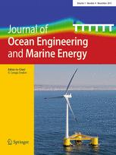
Journal of Ocean Engineering and Marine Energy
Empowering Change through Marine Energy InsightsJournal of Ocean Engineering and Marine Energy, published by SpringerNature, stands at the forefront of interdisciplinary research within the fields of ocean engineering and marine energy. Since its inception in 2015, this journal has aimed to address critical challenges and innovations in energy systems, particularly those harnessed from marine environments, thereby contributing to sustainable development and efficient resource management. With an esteemed Q2 ranking in multiple categories such as Energy Engineering and Power Technology, and Ocean Engineering, the journal serves as a vital platform for researchers, professionals, and students seeking to disseminate and engage with cutting-edge research and technological advancements. Boasting a robust readership and a commitment to open-access principles, the journal fosters a collaborative environment for the exploration of new ideas and approaches in a rapidly evolving sector. By bridging the gap between academia and industry, Journal of Ocean Engineering and Marine Energy remains instrumental in shaping the future of renewable energy solutions and environmental sustainability.

JOURNAL OF OCEANOGRAPHY
Fostering Interdisciplinary Insights in OceanographyJOURNAL OF OCEANOGRAPHY, published by Springer, stands as a leading academic journal in the field, with an impressive Q1 ranking in Oceanography for 2023. Since its inception in 1992, this journal has dedicated itself to the dissemination of high-quality research that spans a diverse array of topics within oceanography and earth sciences. With an ISSN of 0916-8370 and an E-ISSN of 1573-868X, it plays a crucial role in bridging the gap between academia and practical marine applications. The journal is indexed in Scopus, ranking #57 out of 145 in its category, reflecting its rigorous academic standards and the impact of its published works, reaching a notable ile in the 61st percentile. Located in Japan, the JOURNAL OF OCEANOGRAPHY provides a vital platform for sharing significant research findings that contribute to our understanding of marine environments, aiming to foster interdisciplinary collaboration among researchers, professionals, and students dedicated to marine science.
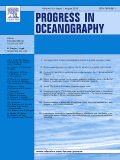
PROGRESS IN OCEANOGRAPHY
Charting New Territories in OceanographyPROGRESS IN OCEANOGRAPHY is a pivotal journal published by PERGAMON-ELSEVIER SCIENCE LTD, dedicated to advancing the field of oceanographic research and exploration. With an ISSN of 0079-6611 and an E-ISSN of 1873-4472, this esteemed publication has been disseminating significant findings from 1963 and continues to be a cornerstone in aquatic sciences and geology, holding a distinguished Q1 ranking in both categories as of 2023. The journal primarily focuses on innovative research that contributes to our understanding of ocean processes, marine ecosystems, and the impact of human activities on the oceans. Its exclusive access model facilitates the dissemination of high-quality content that resonates with researchers, professionals, and students alike, ensuring that vital insights are accessible to the global scientific community. With a firm commitment to upholding rigorous scientific standards, PROGRESS IN OCEANOGRAPHY remains an influential platform for the communication of groundbreaking research, providing scholars with invaluable resources to drive future oceanographic studies.
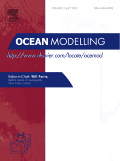
OCEAN MODELLING
Innovating Insights for Marine Mastery.OCEAN MODELLING, published by Elsevier Science Ltd, is a leading journal dedicated to advancing the understanding of ocean systems through innovative modeling techniques and interdisciplinary research. With an ISSN of 1463-5003 and E-ISSN 1463-5011, this journal is esteemed within the fields of Atmospheric Science, Computer Science (Miscellaneous), Geotechnical Engineering and Engineering Geology, and Oceanography, as reflected by its impressive quartile rankings in 2023, including Q1 in Oceanography and Q1 in Computer Science. Researchers and professionals benefit from the journal’s high-impact contributions, as indicated by Scopus rankings that place it among the top-tier publications in its categories. Although not an open-access journal, OCEAN MODELLING provides essential insights and methodologies crucial for both academic and practical applications, facilitating knowledge transfer and innovation among marine scientists, engineers, and policy-makers engaged in vital ecological studies and technological advancements regarding our oceans. Join the forefront of marine modeling research by contributing to and exploring the wealth of knowledge presented in OCEAN MODELLING.
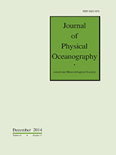
JOURNAL OF PHYSICAL OCEANOGRAPHY
Exploring the Depths of Ocean ScienceJOURNAL OF PHYSICAL OCEANOGRAPHY, published by the American Meteorological Society, stands at the forefront of the oceanographic research domain, with a distinguished history dating back to 1969. As a crucial resource for researchers, professionals, and students, this journal focuses on the physical aspects of our oceans, facilitating the dissemination of innovative studies that enhance our understanding of ocean dynamics, climate interactions, and marine ecosystems. With an impressive impact factor and a Q1 ranking in Oceanography, it ranks 30th out of 145 journals in the Earth and Planetary Sciences category (Scopus), placing it in the 79th percentile of its field. Its commitment to high-quality, peer-reviewed content ensures that the latest advances in oceanographic science are accessible to a global audience. Although the journal does not currently offer open access options, it remains a vital platform for cutting-edge research that shapes the future of oceanographic science and its applications.

OCEAN DYNAMICS
Unveiling the Mysteries of OceanographyOCEAN DYNAMICS is a premier peer-reviewed journal published by Springer Heidelberg, dedicated to advancing the field of oceanography. With an ISSN of 1616-7341 and an E-ISSN of 1616-7228, the journal has established itself as a key resource for researchers and professionals interested in the dynamic processes of the world's oceans. As of 2023, it holds an impressive Q2 category ranking in Oceanography, placing it among the top journals in its field (Rank #34/145, 76th percentile in Earth and Planetary Sciences). Although operating under a traditional publishing model without open access options, OCEAN DYNAMICS continues to provide valuable insights and a platform for innovative research, boasting coverage from 2001 to 2024. Researchers and students alike will benefit from this journal's commitment to showcasing cutting-edge studies that enhance our understanding of oceanographic phenomena.
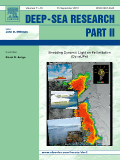
DEEP-SEA RESEARCH PART II-TOPICAL STUDIES IN OCEANOGRAPHY
Navigating New Frontiers in Marine ScienceDEEP-SEA RESEARCH PART II-TOPICAL STUDIES IN OCEANOGRAPHY is a leading journal in the field of oceanography, published by PERGAMON-ELSEVIER SCIENCE LTD. With an impressive ranking of Q1 in Oceanography and holding the 20th position out of 145 journals in the Earth and Planetary Sciences category, this journal provides a prominent platform for researchers and practitioners alike. Covering topical studies in oceanography since its inception in 1993, it continues to contribute significant insights into deep-sea research, enhancing our understanding of marine environments. Although the journal does not presently offer Open Access options, it remains a vital resource, appealing to students and professionals who seek to engage with innovative research and practical applications in the oceanographic community. The journal's ongoing commitment to excellence is evident as it plays a crucial role in advancing the field leading up to the present day and beyond.
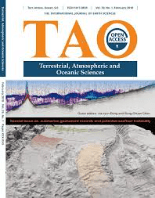
TERRESTRIAL ATMOSPHERIC AND OCEANIC SCIENCES
Exploring the Depths of Earth and SkyTERRESTRIAL ATMOSPHERIC AND OCEANIC SCIENCES, published by SpringerNature, is a distinguished peer-reviewed journal that has been an essential platform for innovative research in the fields of atmospheric science, oceanography, and Earth and planetary sciences since its inception. With an Open Access policy established in 1990, the journal ensures wide dissemination of knowledge, allowing researchers, professionals, and students to access cutting-edge findings without restrictions. Based in Switzerland and featuring a comprehensive coverage from 1996 to 2024, the journal currently holds a Q3 ranking across various categories, indicating its growing significance in the scientific community. Although it is positioned within the 39th percentile in Earth and Planetary Sciences, its commitment to fostering high-quality research makes it a valuable resource for advancing understanding of terrestrial environments and their interconnections. Researchers seeking a platform for their work in atmospheric and oceanic sciences will find TERRESTRIAL ATMOSPHERIC AND OCEANIC SCIENCES to be an ideal venue for sharing their insights with a global audience.